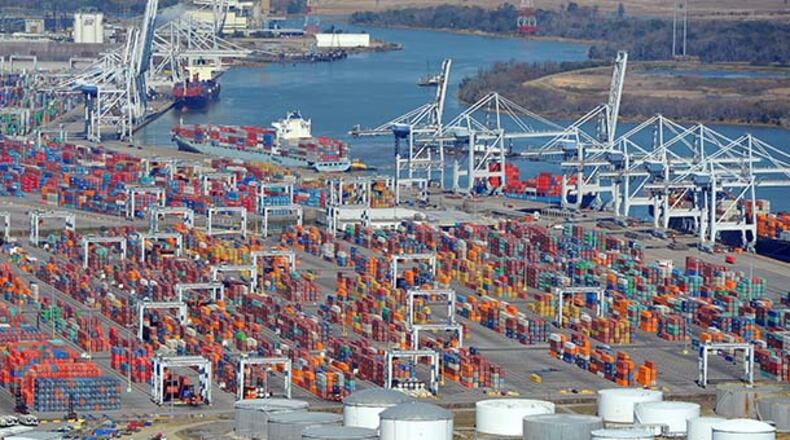After two frustrating decades of planning and politics, the deepening of Savannah’s port — Georgia’s most-coveted economic development project — moved a major step closer Thursday with congressional approval of a water projects bill.
The so-called Water Resources Reform and Development Act, which authorizes $706 million to deepen 41 miles of the Savannah River, now awaits President Barack Obama’s signature. The bureaucratic equivalent of a handshake between state and federal officials is about all that keeps the first shovel from scooping out Savannah river mud.
Dredging could commence in December. Ever-larger container ships could begin plying the river by late 2017 or early 2018.
"The bad news about it taking so long is over," U.S. Sen. Johnny Isakson told The Atlanta Journal-Constitution after the Senate voted 91-7 to pass the water bill. The House approved the legislation Tuesday. "It's a great sense of relief. … The most important responsibility I have in the United States Senate is seeing the Savannah Port project to fruition."
Isakson and other port supporters, though, would be wise to keep the champagne on ice. Nothing has ever come easily for the port project that will deepen the river to 47 feet from 42 feet, allowing mega-ships coming through a soon-to-be-expanded Panama Canal to save time and money while running the Savannah River. Serious environmental issues, for example, loom. Lawsuits could be filed.
The U.S. Army Corps of Engineers, as part of its voluminous, years-long analysis of the deepening project, says that every $1 spent deepening the river will return $5.50 in economic benefits to shippers, manufacturers and retailers.
Savannah and its sister port in Brunswick contribute an estimated $39 billion annually into the state’s economy, according to the University of Georgia. About 100,000 jobs across metro Atlanta rely on goods flowing in and out of the ports.
Once the president signs the bill, and corps officials in Washington give a final OK, state and federal officials in Savannah will get busy on a Project Partnership Agreement detailing how costs will be divvied up between the state and the corps. Officials expect the agreement to get hashed out within 90 days. Contracts will then be bid and let.
Dredge shovels will first attack the “outer channel” that runs from the river’s mouth 15 miles into the ocean. The “inner channel,” the remaining 26 miles of the Savannah River running past Tybee Island, downtown Savannah and the Talmadge Bridge to the port, won’t be dug until serious environmental issues are resolved.
More than half the project’s price tag is tabbed for environmental mitigation, including $72 million alone for mechanical respirators intended to provide oxygen to bottom-dwelling fish.
“Given the volume of water and the tides moving in and out, we’re concerned that the oxygenation system can’t be relied upon to mitigate for impacts the harbor deepening will have on an already impaired river,” said Chris DeScherer, an attorney with the Southern Environmental Law Center, which fought the deepening.
Billy Birdwell, a corps spokesman in Savannah, said the respirators will work.
“Our tests were successful,” he said. “The technology is not new and has been used elsewhere. We know this system works.”
Washington has only contributed a few million dollars to deepen the river, raising fears that Georgia taxpayers may have to go it alone. Isakson and others, though, expect future budgets to fully cover Washington’s $450 million-plus share of the project.
“It’s clear from everyone involved that this is a high-priority project,” said Curtis Foltz, executive director of the Georgia Ports Authority. “It comes out on top with the corps, the economic development world and the financial world in terms of return on investment. I expect the federal government to take care of this.”
Until then, Georgia can begin spending the $266 million already appropriated by the Georgia General Assembly. In addition to outer channel dredging, the corps will focus early on removal of the CSS Georgia, a sunken Civil War ironclad; a water impoundment project for the city of Savannah; and passageways well up the Savannah River to allow fish to reach spawning grounds.
“We didn’t close the book on this project today, but we did jump forward several chapters,” U.S. Sen. Saxby Chambliss, R-Ga., said on the Senate floor.
About the Author
Keep Reading
The Latest
Featured




